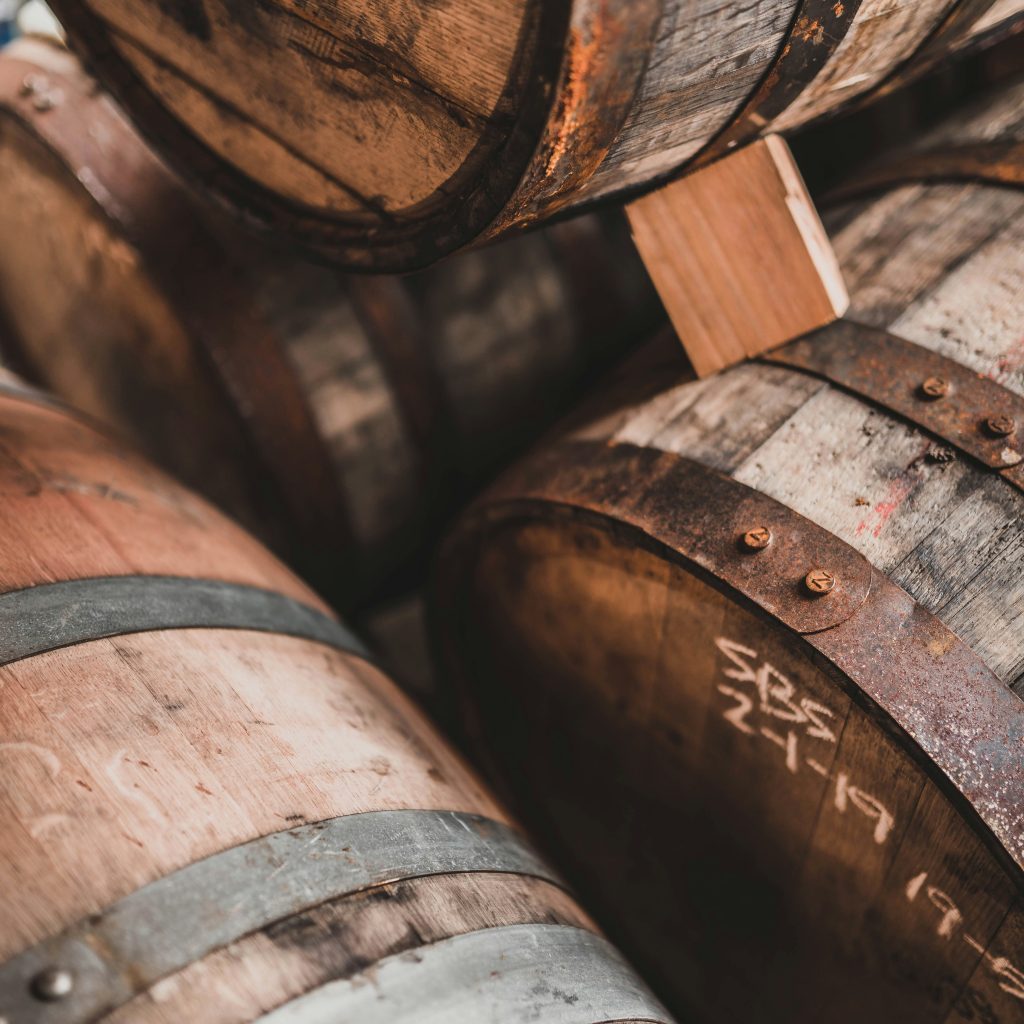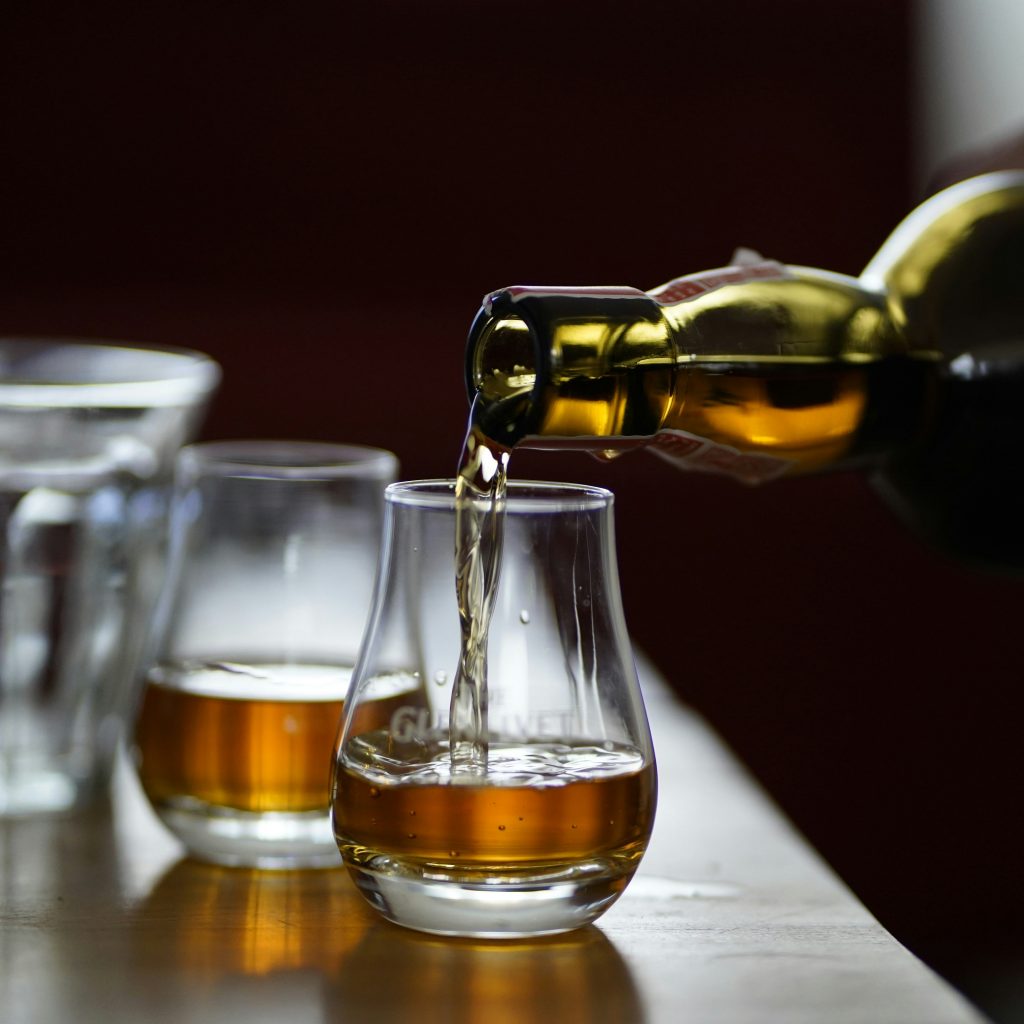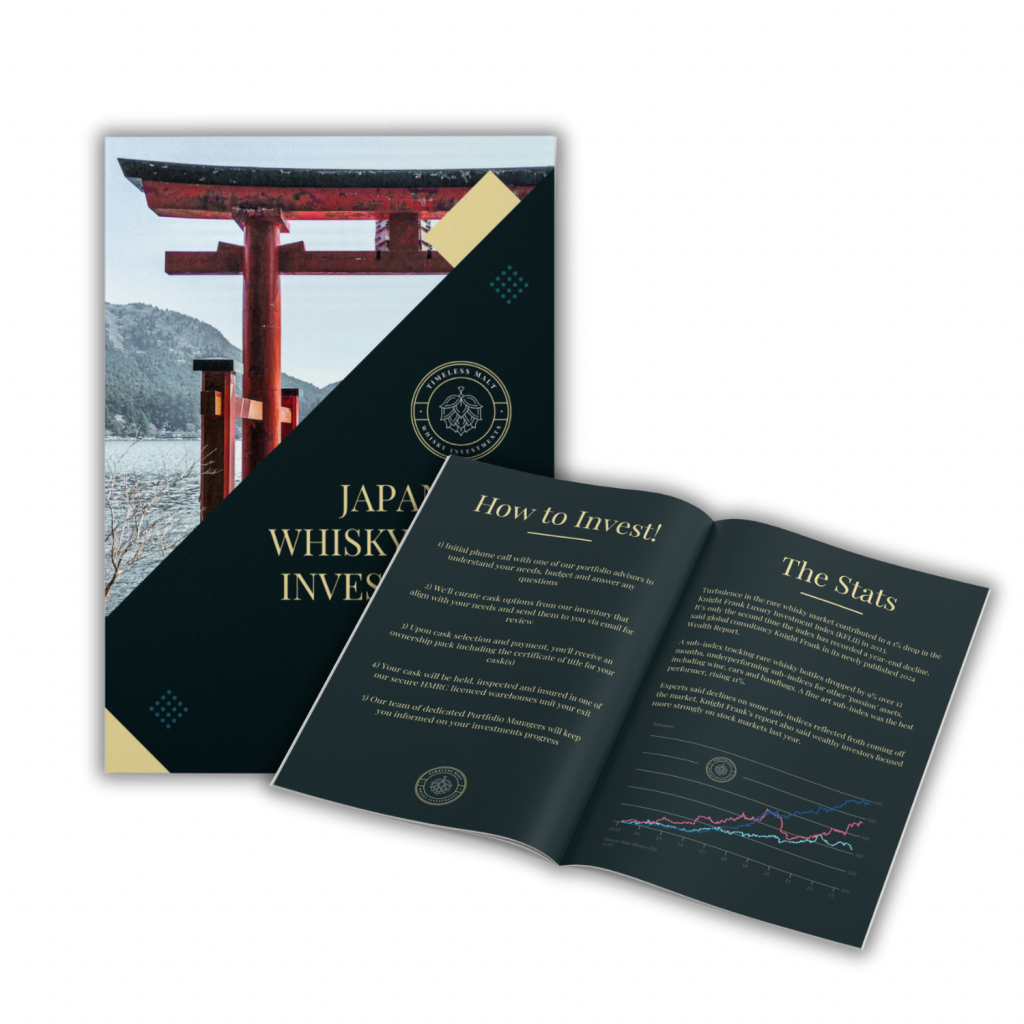
Own a piece of history:
Invest in Japanese Whisky Casks
Originating in the early 20th century, Japanese whisky has rapidly gained recognition and acclaim among collectors & connoisseurs. Influenced by Scotch whisky production techniques, Japanese distilleries have crafted their own unique style, characterized by precision and refinement.
Why Invest In Japanese Whisky?
- Entry from $5000 USD
- Minimum Hold: 9 Years
- Expected ROI of 44.4% per Annum
- Storage & Insurance included
- Invest in legacy brands steeped in history
- Multiple proven exit strategies
- Free of Capital Gains Tax*
- Highly liquid asset class

Why Invest In Japanese Whisky?
Time ripens rewards in Japanese whisky
Similar to Scotch, the allure and value of a cask undeniably rise with age. Drawing inspiration from Scotland’s whisky-making heritage, Japanese distillers have refined their techniques over the decades, resulting in an unparalleled level of craftsmanship.
Additionally, Japanese whisky has embraced innovation while staying true to its roots, experimenting with different cask types and blending methods to create unique expressions. This dedication to innovation has earned Japanese whisky a prominent place on the global stage, with numerous awards and accolades cementing its reputation as a world-class spirit.
The global market for spirits is witnessing a surge, and Japanese whisky stands out as a champion. This coveted spirit boasts exceptional performance, outpacing the broader market and generating significant interest among investors.
Here’s a glimpse into this thriving landscape:
- Market Growth: The Rare Whisky 101 Japanese Whisky Index reflects an impressive 11.75% gain in 2022, showcasing the overall strength of the Japanese whisky market
- Limited Production: Japanese whisky production adheres to strict quality standards and often faces limitations due to factors like aging requirements. This scarcity fuels demand and value
- Rich Heritage & Quality: Renowned for its meticulous craftsmanship and distinct flavor profiles, Japanese whisky has earned a reputation for exceptional quality, attracting a passionate global audience
- Investment Potential: With its limited availability and consistent growth, Japanese whisky has become a coveted asset class for investors seeking diversification and high-performing alternatives

The Whisky Market...
The global whisky investment market thrives, driven by rising wealth and appreciation for premium, diverse spirits. Japanese and Scotch whiskies investments lead the surge, boasting rich heritage, unique flavors, and prestigious awards. This demand fuels the investment potential of rare casks, offering a chance to outperform traditional investments.
Our expertise unlocks a projected 400% ROI over 9 years, shattering the average 15% return. This quadruples your capital, showcasing exceptional growth and outperforming typical whisky investments. It signifies the potential for significant wealth creation and compounding gains for long-term financial success.
How To Invest In Japanese Whisky?
1
Initial phone call with one of our portfolio advisors to understand your needs, budget and answer any questions
2
We’ll curate cask options from our inventory that align with your needs and send them to you via email for review
3
Upon cask selection and payment, you’ll receive an ownership pack including the certificate of title for your cask(s)
4
Your cask will be held, inspected and insured in one of our secure, licenced warehouses unit your exit
5
Our team of dedicated Portfolio Managers will keep you informed on your investments progress
Ultimate Tax Efficieny
Investing in whisky casks offers a unique tax benefit due to their classification as “wasting assets” in many regions, including the UK. This classification stems from the expected lifespan of a cask’s contents being under 50 years. As the whisky matures and eventually gets consumed, its value is considered to gradually diminish.
In jurisdictions like the UK, this “wasting asset” status often translates to an exemption from Capital Gains Tax (CGT) when selling your cask. This means any potential profit you earn from the increased value of the cask over your ownership period wouldn’t be subject to CGT.

Japanese Whisky Cask Investment Guide
Download your free guide about
'Japanese Whisky Cask Ownership'
Request your copy of our ‘Japanese Whisky Investment Guide’ and start your journey into Investment Grade Whisky today!

Your FREE Investment Guide Includes:
- Overview of our Products & Services
- Reasons to invest in Whisky
- Benefits of Whisky Cask Ownership
- Japanese Whisky Facts
- Choosing the right Distillery
- Choosing the right Cask
- The Purchase Process
- Understanding your documentation
- Storage & Provenance of your Whisky
- Frequently asked questions
“There is no bad whisky. There are only some whiskys that aren’t as good as others”
Raymond Chandler
Frequently Asked Questions
ABV stands for Alcohol By Volume. It’s a measurement indicating the percentage of pure alcohol present in a liquid, in this case, whisky.
n some jurisdictions, like the UK, whisky stored in casks is considered a “wasting asset” due to its expected lifespan of under 50 years. As the whisky matures and eventually gets consumed, its value is considered to gradually diminish. This classification often translates to an exemption from Capital Gains Tax (CGT) on any profit you earn from selling your cask.
Important Note: Tax laws and regulations vary significantly depending on your location. Always consult with a qualified tax professional to understand the specific tax implications for cask ownership in your jurisdiction.
Bulk litres is a term used to describe the total volume of liquid within a cask. This includes both the pure alcohol (measured in Original Litres of Alcohol (OLA)) and the water content.
The recommended holding period for whisky casks typically ranges from 5 to 10 years. This allows sufficient time for the whisky to mature and potentially increase in value. In this case, we advise holding your cask for 9 years as per the information provided.
The angel’s share refers to the natural evaporation of whisky that occurs during the maturation process. Due to the porous nature of the cask wood, a small amount of whisky evaporates each year. This loss can range from 1-2% annually.
- OLA (Original Litres of Alcohol): This represents the initial volume of pure alcohol filled into the cask at the start of the maturation process.
- RLA (Remaining Litres of Alcohol): This signifies the current volume of pure alcohol remaining in the cask after accounting for the angel’s share and any potential evaporation.
Your cask will typically be insured against fire, theft, and accidental damage. The specific details of the insurance coverage will be outlined in the cask ownership agreement provided by your chosen provider.
Yes, there is typically a minimum purchase price involved in acquiring a cask. The specific amount can vary depending on the distillery, age of the cask, and other factors. In this case, the minimum investment is around $5000 USD.
Yes, the cask whisky market is subject to regulations. Depending on the location, these regulations may involve:
- Licensing requirements for cask brokers and sellers.
- Standards for cask storage and handling.
- Consumer protection measures.
A HMRC Bonded Warehouse is a secure and government-regulated storage facility authorized by Her Majesty’s Revenue and Customs (HMRC) in the UK. These warehouses ensure the safekeeping of your cask under strict supervision and guarantee the suspension of duty payments until the time of sale.
Upon purchasing a cask, you will typically receive ownership documentation including a certificate of title. This document verifies your ownership of the specific cask and serves as proof of its existence.
No, guarantees cannot be offered regarding the future value of your cask investment. While historically, investment-grade whisky has shown year-on-year price increases, the market is subject to fluctuations, and there’s always a degree of inherent risk involved.
Cask breakages are rare occurrences. However, reputable cask providers typically have insurance policies in place to cover such situations. In the unfortunate event of a cask breaking, you would likely receive compensation based on the remaining litres of alcohol (RLA) and the prevailing market value.
- Certificate of Ownership: Upon purchase, you’ll receive a certificate and relevant documents confirming your legal ownership of the cask(s).
- Estate Planning: Your casks become part of your estate upon death and will be subject to inheritance tax regulations. Having a will allows you to determine how your estate, including the casks, will be distributed.
Disclaimer
Timeless Malt are not tax experts or financial advisers. If you need further clarification or advice on cask whisky purchasing please contact your financial adviser and tax specialist.
– Whisky cask investments are unregulated in the UK
– Fees apply and these are outlined in our terms and conditions
1. Timeless Malt are not tax experts. If you need further clarification or advice on cask whisky purchase please contact your tax specialist or accountant.
2. We are not financial advisers, and the information in our brochure and on our website is purely to inform you about the nature of the Japanese whisky industry so that you can make an informed decision should you choose to buy a cask. We recommend you to speak to your financial adviser in the first instance.
3. The value of cask whisky can go up as well as down. If you wish to speak to someone regarding the cask buying process or any points raised in this guide or our website, please don’t hesitate to contact us.